wish-和-if-only-引导的虚拟语气的用法
虚拟语气全归纳 四大类别

虚拟语气全归纳四大类别If虚拟条件句Wish/if only/would rather愿望和as if(though)好像从句中should+动词原形,should可省略It’s time从句第一类 If虚拟条件句分三种时态:与现在事实相反、与过去事实相反、与将来事实相反。
*条件句有真实条件句和非真实(虚拟)条件句两种。
真实条件句的假设是有可能发生的,而非真实条件句的假想与事实相反或不大可能会发生,试比较:If I have time, I will go with them. 假若我有时间,我就同他们去。
(陈述语气)If I were you, I would go with them. 假若我是你,我就同他们去。
(虚拟语气)If条件句虚拟时态类型主句If引导的从句例句与现在相反would/should/could/might+ V原动词过去式 did*be 多用were1. If I were you, I should study English.2. I would certainly go if I had time.与过去相反would/should/could/might + have done动词过去完成式had done1. If you had taken my advice, you would not have failed in the test.2. If I had left a little earlier, Iwould have caught the train.与将来相反would/should/could/might + V原①动词过去式②should +V原③were+ to do1.If you came tomorrow, we would havethe meeting. ①2. If it were to rain tomorrow, the meeting would be put off.③*规律总:从句都往过去推一个时态,如:与现在相反的if 从句就用过去时;与过去相反用过去完成时(即去的过去)注:几点特别说明1、l would/should/could/might 主句谓语中的should主要用于第一人称后;would表示结果,might表示可能性,could表示能力、允许或可能性。
人教版高中英语选修-unit-虚拟语气
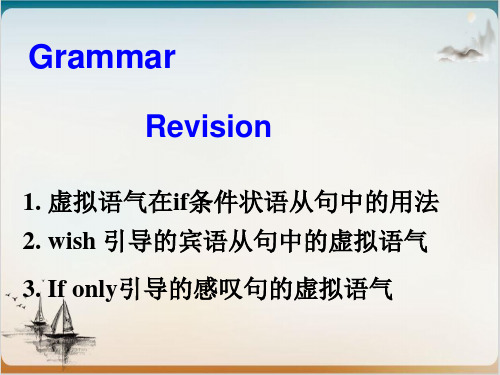
又有相关法律、法规规定的,采购代理机构对此所做解释以相关的法律、法规规定为依据。 4.2.9本企业的安全生产责任制和安全生产规章的内容;
8、It is (high) time that It is (high) time that 后面的从句谓语动词要用
过去式或用should加动词原形, 但should不可
省略。 6.1 卖方应根据合同货物的不同形状与特点,对所提供的全部货物均应按标准保护措施进行包装,以防止货物在转运中损坏或变质。
would /could/ might +do
would/could/might + have+done
与将来事实 1.should+动词原形
相反
2.动词过去式
3.were to+动词原形
would/ could/ might +do
2.wish 引导的宾语从句中的虚拟语气
与现在事实相反
过去时(were)
帝说之,超迁,一岁中至太中大夫。
2.能力目标:结合社会现象观察、思考我国如何坚持党的领导和宪法是如何规范国家权力以保障公民权利的,初步形成对复杂情形作出
proposal, advice, 合理判断的能力。
4、声音强弱控制走廊照明灯开关等
demand,
requirement,
request,
师:看来你对历史很感兴趣哦,历史学习的很不错。就像这位孩子所理解的,从碑文可以反映出我国发展的不容易,反映了中国人民
wish和ifonly引导的虚拟语气的用法上课讲义

wi s h 和i f o n l y 引导的虚拟语气的用
法
Wish后宾语从句用虚拟语气
A用法说明
动辺侧曲百接宾语从句吋■从句谓语要用虛拟语耳若要丢示与现在事实相反的愿望f从句谓语用一般过去时或过古进行时;若轰示与过去相反的愿望,从句渭语用过去^EHl^Gwould / could+have +过去分词;若表示将来没有把握或不太可能实现的愿望/用认ould (could) + j®词原形.如:
注:特别注産
从句的时态只与从句片拾的时闾有关’而与wish的时态无关,比较:
I wish I were rich.要是我现在有践就好了.
1 wish I had been rich. SBTOt我伺钱就好了*
I wished I were rich.当时我石1S自己沒有钱匚
1 wished I had been rich.当时找后悔自己曾经浊有铁.
If only后的句子用虚拟语气
if Ohly与I wish-W ■也用于表示与事实相反的喝里,冥右所虛拟谊气的时态与wish后所播时态的情况相同:
If only she had had more courage:她再勇敢一些就好了“
If only I had listened to my parents!我要星当吋听了父51的话就好了.
If only she would go with me!她要是愿意和我一iB去就好了!
汙:if only通當独立悖用’没有丰句.。
高中英语破题致胜微方法(虚拟语气2)3“无法实现的愿望”-ifonly感叹句中的虚拟语气

3.“无法实现的愿望”——if only感叹句中的虚拟语气if only常常用来表达强烈的愿望或遗憾,主要用在虚拟语气中,用以表达强烈的愿望或非真实条件,意为“但愿”、“要是……该多好啊”,意思和wish相似, 用法和wish基本相同,可表示对现在,过去和将来的虚拟,只是比wish感情色彩更强烈一些。
本节课我们就一起来学习一下if only 感叹句中的虚拟语气。
一. 时态规则注意:if only 后的虚拟语气时态规则和wish的用法相同。
对现在的虚拟:If only I were taller. 我的个子要是能再高一点就好了。
If only I were better looking. 要是我长得漂亮些就好了。
对过去的虚拟:If only I had not married before I met you!要是遇见你之前,我没有结婚就好了。
If only she had had more courage!她再勇敢一些就好了。
对将来的虚拟:It has been raining for three days. If only the rain would stop.已经下了三天的雨了,要是雨能停就好了。
I felt sure that I could be a grownup if only my parents would get out of my way. 我肯定,只要父母不阻挠,我一定可以做个大人二. 解题方法1. 看到if only,想到需要使用虚拟语气;2. 根据句子中的时间状语或语境判断出虚拟的时间;3. 根据虚拟的时间,找出对应的时态;4. 牢记时态规则三. 经典例题1. Look at the terrible situation I am in! If only I_________your advice.A. followB. had followedC. would followD. have followed答案:B解析:看到if only 要想到后面需要使用虚拟语气。
wish的用法总结

wish的用法总结wish的用法篇一二、不同之处 1. wish作为及物动词,可接名词或代词作宾语,hope则不能。
Do you wish a pen or a book?你要的是钢笔还是书?2. wish能接双宾语表示祝愿,hope则不能。
I wish you success. 我祝你成功。
3. wish能接复合宾语,hope则不能。
I wish you to go with me.我希望你同我一道去。
4. wish和hope都能接that引导的从句,但wish后的从句的谓语动词要用虚拟语气(动词用过去时,或过去完成时),hope则用所需要的时态。
I hope that he will win the game.我希望他会赢得这场比赛。
I wish that I knew the answer.我希望我知道这个答案。
I wish I had bought it yesterday.我希望昨天买了它。
5. hope可与so或not连用,分别代替一个具有肯定和否定意义的宾语从句,以免重复,wish则不能。
-Will it be fine tomorrow?-I hope so.-Will it rain tomorrow?-I hope not.三、wish, hope都可作名词,可数或不可数均可,wish表示“愿望”“心愿”“祝愿”,hope 表示“希望”。
1. My wish is to bee a doctor.我的愿望是当一名医生。
2. It is said that they have realized their wishes.据说他们已实现了他们的愿望。
3. I have no (not much) wish to see him.我并不(不大)想见他。
4. Send him my best wishes.请代我向他致意。
5. Where there is life there is hope.有生命就有希望。
虚拟语气的用法分类

虚拟语气虚拟语气是一项语法难点,为了便于理解与记忆,我们把虚拟语气分成三大块: I.名词从句中的虚拟语气标志词+should+动词原形 II .非真实条件从句中的虚拟语气种类 1. 三种基本态 2. 倒装虚拟句 3. 混时虚拟句 4. 含蓄虚拟句 5. 跳层虚拟句III .其它情形中的虚拟语气(wish/would rather/it^s high time …/if only …/as if …) I 、名词从句虚拟语气(1) ask, advise, beg, command, demand, decide, desire, insist, order, prefer, propose, require, recommend, request, suggest, urge 等表示命令、要求、建议等含义的动词后的宾语从句中,谓语动词用(should )+动词原形, eg. I suggest / suggested that we (should ) go tomorrow.名词从句虚拟语气例如: Mr. Johnson insisted that the problem worthy of attention (讨论)at the meeting, (discuss ) (10 湖北 76) 答案:(should ) be discussed(2) It is +(形容词/过去分词/特定名词)+that 的从句中,形容词主要是表示令人吃惊的、重要的、必要的、关键的等 词汇。
形容词:astonishing , amazing, advisable, appropriate, crucial, desirable, essential, important , imperative, keen, necessary , natural, normal, odd, proper, preferable, strange , sorry, shocked, surprising , urgent, unusual, vital 等。
专题11 情态动词与虚拟语气-备战2022年高考英语考试易错题 (教师版含解析)

专题11 情态动词和虚拟语气易错题【01】情态动词基本用法易错题【02】情态动词表推想的用法易错题【03】虚拟语气01情态动词基本用法1.(2020·天津卷)Jim says we ______ stay in his house as long as we leave it clean and tidy .A. mustB. canC. needD. should【警示】本题简洁出错的主要缘由是句子结构分析不清楚。
【问诊】考查情态动词。
句意:吉姆说我们可以住在他的房子里,只要我们保持它洁净洁净。
A. must必需;B. can能,可以;C. need需要;D. should应当。
依据后面的“as long as we leave it clean and tidy”可知,Jim许可我们待在他的房子里,即:我们”能,可以”待在他的房子里。
故选B。
【答案】B【嘱咐】情态动词主要用以表明说话者对某一行为的态度和观点。
用在行为动词前,表示说话者对这一动作或状态的看法或主观设想。
表达说话者的情态主要包括力量、可能、命令、要求、许诺、威逼等。
虽然数量不多,但是用途广泛。
情态动词是表示语气的单词,本身虽然有肯定的词义,但不能独立的作谓语,也没有人称和数的变化,只能和动词一起构成谓语。
情态动词的语法特征:人称和数:情态动词没有人称和数的变化。
句法功能:情态动词不能单独作谓语,后跟动词原形共同构成谓语。
否定形式:多数情态动词的否定式是在情态动词的后面加not。
时态形式:个别情态动词有现在式和过去式两种形式,过去式用来表达更加客气、委婉的语气。
句中位置:情态动词在句中放在谓语之前;谓语动词前若有助动词,则在助动词之前。
疑问句中则在主语之前。
常见的情态动词:1.情态动词近几年常考点总结近几年高考语法填空对情态动词的考查可知,主要涉及以下3点:(1)情态动词后要加动词原形/系动词be构成谓语。
(2)含情态动词的被动语态结构:情态动词+be+过去分词。
虚拟语气的用法

虚拟语气的用法虚拟语气主要用在虚拟条件句中,表示根本不存在的情况或可能性很小的假设。
表示对不同时间的假设时,从句的谓语和主语中的谓语的构成是不同的。
有如下几种情况:(一)If条件句中的虚拟语气例句:1)If we had had enough rain last year ,we could have gained a good harvest.句意:如果去年雨水充足的话,我们可能会有一个好收成。
(与过去事实相反)2)If I should see/were to see/saw him tomorrow ,I would invite him .句意:如果我明天见到他,我会邀请他到家里来。
(与将来事实相反)3)If I had enough moneny,I would buy myself a computer.句意:如果我有足够多的钱,群殴讲自己买一台电脑。
(与过去事实相反)(二)主语+ wish + 宾语从句wish+ 宾语从句:现在:过去时(did/were)过去:过去完成时(had done)将来:would/could/might+V.例句:1)I wish I had a car so that I could go home every day句意:希望我有一辆车,这样,我可以回家的每一天2)The program was wonderful. I wish I had seen it.句意:节目很精彩。
我希望我能看到它。
3)Tomorrow is my birthday. I wish you would come to my party.句意:明天就是我的生日。
希望你能来参加我的聚会。
(三)名词性从句的虚拟语气(一二三四)一个坚持:insist两个命令:order, command三个建议:advise, suggest, propose四个要求:demand , require, request, urge虚拟语气即:(should) do,表示坚持、命令、建议、要求某人去做某事。
wish 虚拟语气
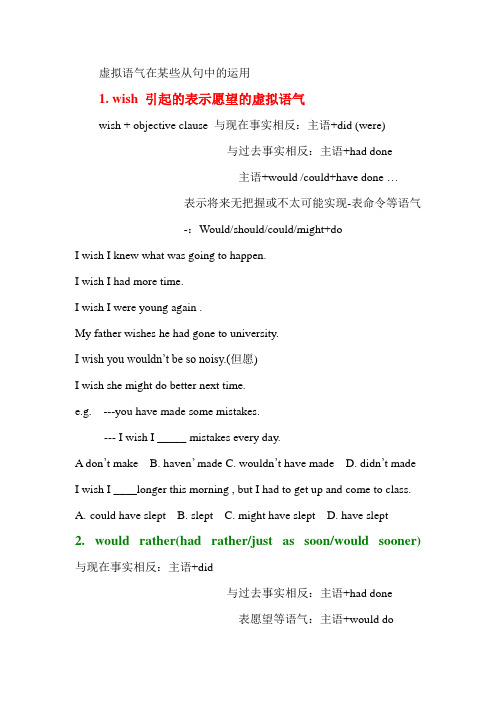
虚拟语气在某些从句中的运用1. wish 引起的表示愿望的虚拟语气wish + objective clause 与现在事实相反:主语+did (were)与过去事实相反:主语+had done主语+would /could+have done …表示将来无把握或不太可能实现-表命令等语气-:Would/should/could/might+doI wish I knew what was going to happen.I wish I had more time.I wish I were young again .My father wishes he had gone to university.I wish you wouldn’t be so noisy.(但愿)I wish she might do better next time.e.g. ---you have made some mistakes.--- I wish I _____ mistakes every day.A don’t make B. haven’ made C. wouldn’t have made D. didn’t made I wish I ____longer this morning , but I had to get up and come to class.A.could have sleptB. sleptC. might have sleptD. have slept2. would rather(had rather/just as soon/would sooner)与现在事实相反:主语+did与过去事实相反:主语+had done表愿望等语气:主语+would doI’d rather you told me the truth.I’d sooner you didn’t ask me that question.I had rather you did it .I’d sooner she painted the wall green next time/I’d rather you hadn’t told me about that .3. would rather… than…would … rather than..I would rather die than ( that) he should know the secret.He’d do anything rather than he should live with such a shameless woman.4. It’s (high/about) time that.. did …..It’s time we went.It is high time you got a job and settled down.It’s already 5 o’clock now. Don’t you think it’s about time____?A.we were going homeB. we go home c. we went home D. we can go home5.lest /for fear that 引起的状语从句The mad man was put in the soft padded cell lest he ___ himself .A.injureB. had injuredC.injuredD. would injured6. if onlyIf only I could speak several languages!If only he were (was) more cautious.If only she had known where to fond you.7.imagineWere….Had done ….Imagine that we were on a desolate island now.Imagine that she had not taken those measures, what would have happened?8. as if /as though与现在事实相反:主语+did (were)与过去事实相反:主语+had done主语+would /could+have done …表示将来无把握或不太可能实现:Would/could/might+doHe talks as if he knew all about it.She looks as though she were sick.I feel as if we ____ each other for years.Know have known were to know had knownIt looks as if it _____ rain/Were is going to were to might9. if it … not for…If it were not for the rain, the crops should become withered.If it had not been for your timely help, I would have gone bankrupt. 10. whether it (he) be… or省略结构必须到装;be it (he)… orEvery day he takes a walk in the park in the evening, whether it be fine orraining.Be it true or not, I will see myself.be he what he may, he must be punished.11 or /or else/otherwise/or otherwise/elseMake more effort, or you will fail.He can’t be so irresponsible, or they wouldn’t have allowed him to do that.--- where have you been?--- I got caught in traffic; ____ I would have been here sooner. However although anyway otherwise。
大学英语四级考试语法系列讲座--虚拟语气1
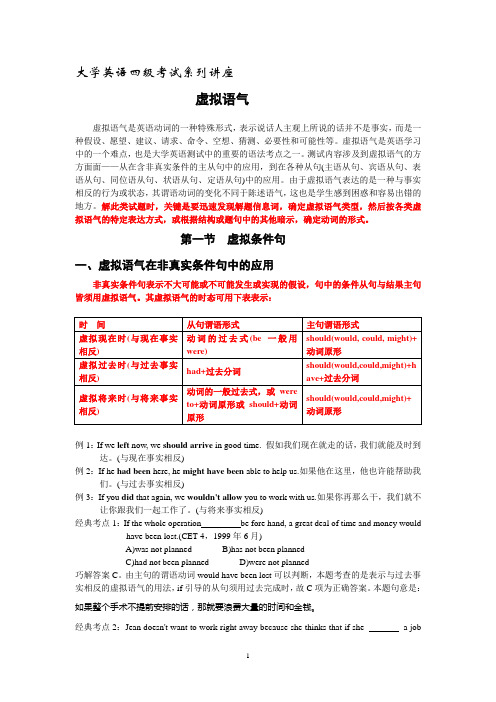
大学英语四级考试系列讲座虚拟语气虚拟语气是英语动词的一种特殊形式,表示说话人主观上所说的话并不是事实,而是一种假设、愿望、建议、请求、命令、空想、猜测、必要性和可能性等。
虚拟语气是英语学习中的一个难点,也是大学英语测试中的重要的语法考点之一。
测试内容涉及到虚拟语气的方方面面——从在含非真实条件的主从句中的应用,到在各种从句(主语从句、宾语从句、表语从句、同位语从句、状语从句、定语从句)中的应用。
由于虚拟语气表达的是一种与事实相反的行为或状态,其谓语动词的变化不同于陈述语气,这也是学生感到困惑和容易出错的地方。
解此类试题时,关键是要迅速发现解题信息词,确定虚拟语气类型,然后按各类虚拟语气的特定表达方式,或根据结构或题句中的其他暗示,确定动词的形式。
第一节虚拟条件句一、虚拟语气在非真实条件句中的应用非真实条件句表示不大可能或不可能发生或实现的假设,句中的条件从句与结果主句皆须用虚拟语气。
其虚拟语气的时态可用下表表示:例1:If we left now, we should arrive in good time. 假如我们现在就走的话,我们就能及时到达。
(与现在事实相反)例2:If he had been here, he might have been able to help us.如果他在这里,他也许能帮助我们。
(与过去事实相反)例3:If you did that again, we wouldn't allow you to work with us.如果你再那么干,我们就不让你跟我们一起工作了。
(与将来事实相反)经典考点1:If the whole operation be fore hand, a great deal of time and money would have been lost.(CET-4,1999年6月)A)was not planned B)has not been plannedC)had not been planned D)were not planned巧解答案C。
虚拟语气汇总

虚拟语气(I)内容简介:虚拟语气表示说话人所说的不是事实,而是一种假设、愿望、怀疑或推测。
文章来源:学英语报社虚拟语气主要用于if条件状语从句中,也可用于名词性从句中。
一、虚拟语气在名词性从句中的应用。
①“wish+宾语从句”表示不可能实现的愿望,汉语可译为“可惜……、悔不该……、但愿……”。
表示现在不能实现的愿望,从句的谓语动词用过去式;表示将来不可能实现的愿望用“would/could+动词原形”;表示过去不可能实现的愿望时用“had+过去分词”。
如:I wish I were better-looking. 要是我长得再漂亮些就好了。
I wish I had met the film star just now. 我要是刚才遇到那位电影明星该多好啊!I wish I would be a solider. 我想当一名军人。
【考例】How I wish every family a large house with a beautiful garden! (上海2002春)A.hasB. hadC. will haveD. had had【答案】B。
②在表示建议、要求、愿望、命令、坚持、想法(advise, command, demand, decide, desire, insist, order, prefer, propose, request, require, suggest)等动词后面的宾语从句,或这些动词的同源名词后面所跟的同位语从句或表语从句中,从句谓语用“should+动词原形”,其中在美国英语中,should常省略。
如:The young man insisted that I (should) go with his fellows.这个年轻人坚持要我同他的同伴们一起去。
The doctor advised that he change his job. 医生建议他换工作。
虚拟语气与各种句型

虚拟语气与各种句型一、I wish句型中的虚拟语气I wish后面的宾语从句,表示不可能实现的愿望。
其动词形式有三种:1. 动词用过去式,表示与现在事实相反的一种愿望。
2. 动词用过去完成式,表示与过去事实相反的愿望。
3. 动词用would/should +动词原形,表示与将来事实很可能相反或不可能实现的愿望。
如:I wish I were a doctor.我希望我是一名医生。
I wish you hadn’t given him my telephone number.我真希望你没把我的电话号码给他。
I wish you’d come back before Christmas.我多么希望你在圣诞节之前回来。
[典型考例]How I wish every family_________a large house with a beautiful garden!(NMET02上海春)A. hasB. hadC. will haveD. had had二、If only句型中的虚拟语气If only引导的句子表示“但愿”,“要是……就好了”。
其用法和I wish 的句型基本相同,只是更具感情色彩。
在If only句型中,动词用过去式,表示一种意愿或假设;动词用过去完成式,表示希望出现和过去事实相反的情况;动词用would +动词原形,表示一时很难实现的愿望。
如:If only I had more time to think about it!但愿我有更多的时间去考虑它。
If only the explosion had not happened!爆炸要是没有发生就好了。
If only he had not eaten so much sugar!要是他不吃那么多糖就好了。
[典型考例1]If only he_________quietly as the doctor instructed, he would not suffer so much now. (NMET2000上海)A. liesB. layC. had lainD. should lie[典型考例2] Look at the trouble I am in! If only I_________your advice. (NMET’03 上海)A. followedB. would followC. had followedD. should follow三、“It’s (high) time that…”句型中的虚拟语气“It’s time that...”句型表示“该是……的时候了”,谓语动词用一般过去式,有时为了强调,在time之前加high一词,表示“早该是……的时候了”。
if 非真实条件句中的虚拟语气
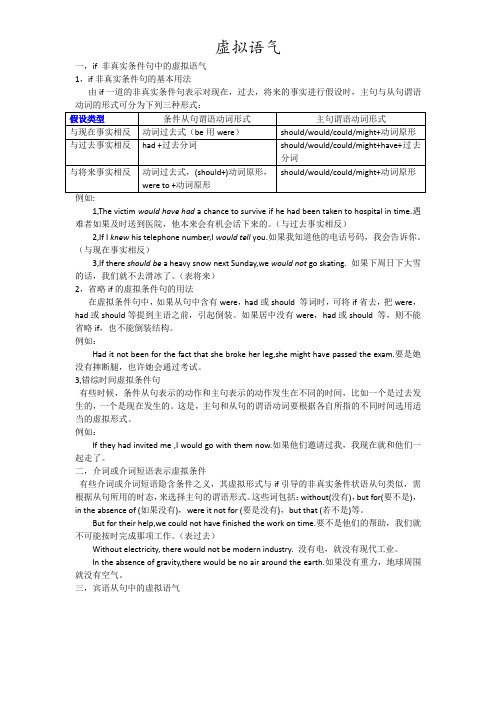
一,if 非真实条件句中的虚拟语气1,if非真实条件句的基本用法由if一道的非真实条件句表示对现在,过去,将来的事实进行假设时,主句与从句谓语动词的形式可分为下列三种形式:1,The victim would have had a chance to survive if he had been taken to hospital in time.遇难者如果及时送到医院,他本来会有机会活下来的。
(与过去事实相反)2,If I knew his telephone number,I would tell you.如果我知道他的电话号码,我会告诉你。
(与现在事实相反)3,If there should be a heavy snow next Sunday,we would not go skating. 如果下周日下大雪的话,我们就不去滑冰了。
(表将来)2,省略if的虚拟条件句的用法在虚拟条件句中,如果从句中含有were,had或should 等词时,可将if省去,把were,had或should等提到主语之前,引起倒装。
如果居中没有were,had或should 等,则不能省略if,也不能倒装结构。
例如:Had it not been for the fact that she broke her leg,she might have passed the exam.要是她没有摔断腿,也许她会通过考试。
3,错综时间虚拟条件句有些时候,条件从句表示的动作和主句表示的动作发生在不同的时间,比如一个是过去发生的,一个是现在发生的。
这是,主句和从句的谓语动词要根据各自所指的不同时间选用适当的虚拟形式。
例如:If they had invited me ,I would go with them now.如果他们邀请过我,我现在就和他们一起走了。
二,介词或介词短语表示虚拟条件有些介词或介词短语隐含条件之义,其虚拟形式与if引导的非真实条件状语从句类似,需根据从句所用的时态,来选择主句的谓语形式。
虚拟语气用法总结(超好,原创)

虚拟语气概念:谓语v 用不同的形式表示说话人的不同意图,这种形式称为语气。
语气分三种:1. 陈述语气:用来陈述一个事实,或提出一种看法,有肯定、否定、疑问、感叹等形式。
He is late for class. What fun!He is not interested in classical music.2. 祈使语气:用来表示请求、邀请、命令、警告或劝告等(动词常用原形)Don’t be late !3. 虚拟语气:表示说话人所说的不是事实,而是一种假设、愿望、怀疑或推测。
一、虚拟语气在if 非真实条件句中1.如果我是你,我会接受他的建议。
If I were you, I would accept his advice.2.如果明天下雨,我会待在家里。
If it rained/should rain/were to rain tomorrow, I would stay at home.3.如果你以前好好学习,你会通过考试的。
If you had studied hard before, you would have passed the exam.You didn’t let me drive. If we in turn, you so tired.A. d rove; didn’t getB. d rove; wouldn’t getC. w ere driving; wouldn’t getD.had driven; wouldn’t have gotB.it rain tomorrow, we would have to put off the visit to the Yang Pu Bridge.A.WereShouldC.WouldD. Will注意:1. 错综时间虚拟语气当从句主句所表示的行为所发生的时间不一致时,动词的形式要根据它所表示的时间作出相应的调整。
If you had followed (follow)my advice just now, you would be(be)better now.If you had studied (study)hard before, you would be(be)a college student now.B If you with George earlier, youso angry now.A.talked; would not be.had talked; would not beC.would talk; would not beD.had talked; would not have beenIf we had taken such effective measures m uch earlier, the riverso seriously n ow.A. i s not pollutedB. w ould not be pollutedC. h ad not been pollutedD. w ould not have been polluted2. if 从句中,were ,had (完成时态标志),should 可以放在句首,(用于倒装结构),if 必须省略。
选修Unit-Art语法(If及wish引导的虚拟语气)

When(时间)
Structure (结构)
与_过__去_事实相 反(现在,过去, 未来)
If sb_h_a_d_d_o_n_e_(动__词__过__去_分__词_,)… sbw__o_u_ld_(_n_o_t)_h_a_v_e_d_o_n_e_(动_.词过去分词)
If it were/ should be fine tomorrow , I would go to see him.
If I were a child, I would be happier.
If he were a bird , he could fly in the big blue sky.
If I had a lot of money, I would buy a villa . (别墅)
Discover1
One years later ,maybe you will be in University
If I should visit/ were to visit/ visited my alma mater(母校) next time, I would go to the library .
If they should play/were to play / played better next time , they would not fail again.
a. If they w__e_r_e (be) here, they _w_o_u_l_d_t_a_k_e_ (take) your advice.
b. If the world-war _b_u_r_s_t (bursp_e_n_ (happen) to our people on earth?
虚拟语气知识点讲解

虚拟语气一、虚拟语气的含义英语中有下列三种语气:陈述语气:用来陈述事实。
用于陈述句、疑问句和感叹句。
祈使语气:提出请求、劝告、指示、命令等。
仅用于祈使句。
虚拟语气:常表示说话人所说的不是事实,或事情发生的可能性很小,或不可能发生,是说话人的一种主观愿望、假设、建议、或推测等。
一般常用于正式的书面语中。
二、虚拟语气在if 引导的非真实条件中的用法:主要用法列表如下:如:If I were you, I should seize the chance to go abroad. (现在)If I had time, I would attend the meeting. (现在)If you had taken my advice, you would not have failed in the exam.If it were to rain tomorrow, the sports meeting would be put off. (将来)II. 易错点分析1、倒装条件句如果条件句中有were, had, 或should 等现成助动词,可把他们提到主语之前,省去if。
Had I had time, I would have helped you.Should it clear up tomorrow, we would go for on outing.Were I you, I would accept the invitation.注意:若省略if的条件句中的谓语是否定形式时,不能用动词的缩略式.如不能说:Weren’t it for the expense, I would go abroad now. 应该说:Were it not for the expense, I would go abroad now.2、错综时间条件句(混合时间句):主句和从句的动作不是发生在同一时间,这时要根据各自的时间来调整。
虚拟语气在各种从句中的用法
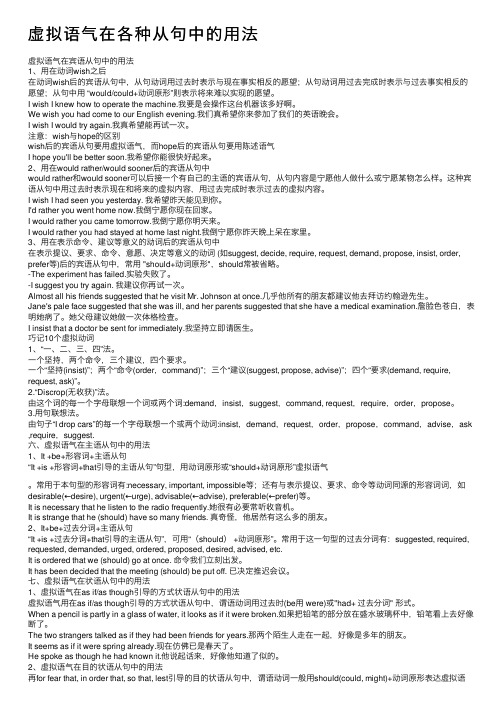
虚拟语⽓在各种从句中的⽤法虚拟语⽓在宾语从句中的⽤法1、⽤在动词wish之后在动词wish后的宾语从句中,从句动词⽤过去时表⽰与现在事实相反的愿望;从句动词⽤过去完成时表⽰与过去事实相反的愿望;从句中⽤ “would/could+动词原形”则表⽰将来难以实现的愿望。
I wish I knew how to operate the machine.我要是会操作这台机器该多好啊。
We wish you had come to our English evening.我们真希望你来参加了我们的英语晚会。
I wish I would try again.我真希望能再试⼀次。
注意:wish与hope的区别wish后的宾语从句要⽤虚拟语⽓,⽽hope后的宾语从句要⽤陈述语⽓I hope you'll be better soon.我希望你能很快好起来。
2、⽤在would rather/would sooner后的宾语从句中would rather和would sooner可以后接⼀个有⾃⼰的主语的宾语从句,从句内容是宁愿他⼈做什么或宁愿某物怎么样。
这种宾语从句中⽤过去时表⽰现在和将来的虚拟内容,⽤过去完成时表⽰过去的虚拟内容。
I wish I had seen you yesterday. 我希望昨天能见到你。
I'd rather you went home now.我倒宁愿你现在回家。
I would rather you came tomorrow.我倒宁愿你明天来。
I would rather you had stayed at home last night.我倒宁愿你昨天晚上呆在家⾥。
3、⽤在表⽰命令、建议等意义的动词后的宾语从句中在表⽰提议、要求、命令、意愿、决定等意义的动词 (如suggest, decide, require, request, demand, propose, insist, order, prefer等)后的宾语从句中,常⽤ "should+动词原形",should常被省略。
虚拟语气各类用法

各类用法wish 后宾语从句a、表示与现在事实相反的愿望,谓语动词用过去式eg. I wish I had your brains.我希望我有你那样的头脑。
(事实:我根本比不上你)b、表示与过去事实相反的愿望,谓语动词:had+doneeg:.I wish I had known the truth of the matter.我希望我那时就知道这件事情的真相。
(事实:那时还不知道)c、表示将来难以实现的愿望谓语动词:should/would(情态动词) + 动词原形eg. I wish I should have a chance again.我希望我还能有一次这样的机会。
(事实:很难再有这样的机会了)注:if only引导的感叹句和as if/as though引导的状语从句也有相同用法目的状语从句1、在for fear that,in case,lest引导的从句中,若用虚拟语气时,从句谓语为:should + do。
并且should能省略She examined the door again for fear that a thief (should) come in.她又把门检查了一遍,以防盗贼的进入。
He started out earlier lest he (should) be late.他早早的就出发了以防迟到。
2、在so that,in order that 所引导的目的状语从句中,从句中的谓语为:can / could / may / might / will / would / should + do 。
He goes closer to the speaker so that he can hear him clearer. 他走近说话的人以便能听得更清楚。
He read the letter carefully in order that he should not miss a word. 他把信读得很仔细以便不漏掉一个字。
虚拟语气大全

英语虚拟语气归纳整理【四大类别】1.If虚拟条件句2.Wish/if only/would rather愿望和as if(though>好像3.从句中should+动词原形,should可省略4.It’s time从句第一类 If虚拟条件句分三种时态:与现在事实相反、与过去事实相反、与将来事实相反。
*条件句有真实条件句和非真实(虚拟>条件句两种。
真实条件句的假设是有可能发生的,而非真实条件句的假想与事实相反或不大可能会发生,试比较:b5E2RGbCAPIf I have time, I will go with them. 假若我有时间,我就同他们去。
(陈述语气> p1EanqFDPwIf I were you, I would go with them. 假若我是你,我就同他们去。
(虚拟语气> DXDiTa9E3dIf条件句虚拟注:几点特别说明1、l would/should/could/might 主句谓语中的should主要用于第一人称后;would表示结果还表示过去经常常常做某事,might表示可能性,could表示能力、允许或可能性。
比较:RTCrpUDGiTIf you tried again ,you would succeed. 要是你再试一试,你就会成功的。
(would表结果> 5PCzVD7HxAIf you tried again, you might succeed. 要是你再试一试,你可能会成功的。
(might表可能> jLBHrnAILgIf you tried again ,you could succeed. 要是你再试一试,你就能成功了。
(could表能力> xHAQX74J0X2、错综时间虚拟条件句:即条件从句与主句所指时间不一致,如从句指过去,而主句即指的是现在或将来,此时应根据具体的语境情况,结合上面提到的三种基本类型对时态作相应的调整:LDAYtRyKfE If it had rained last night, the ground would be wet now. 要是昨晚下过雨的话,现在地面就会是湿的。
